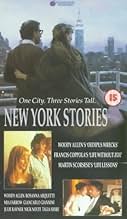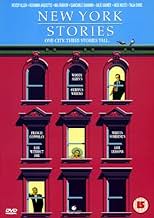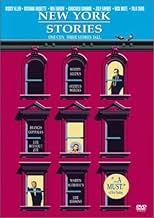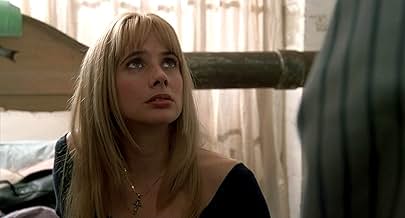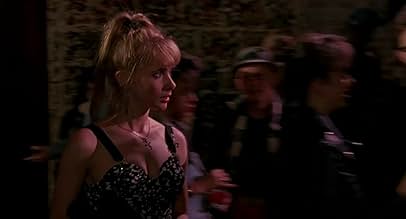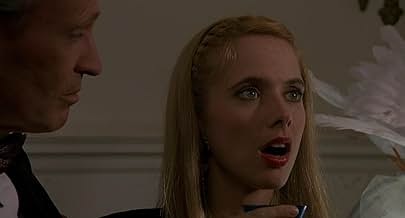Ein Künstler in mittlerem Alter, der seiner hübschen jungen Assistentin verfallen ist, eine frühreife Zwölfjährige, die in einem Hotel lebt, und ein neurotischer Anwalt mit einer besitzergre... Alles lesenEin Künstler in mittlerem Alter, der seiner hübschen jungen Assistentin verfallen ist, eine frühreife Zwölfjährige, die in einem Hotel lebt, und ein neurotischer Anwalt mit einer besitzergreifenden Mutter machen diese drei New Yorker Geschichten aus.Ein Künstler in mittlerem Alter, der seiner hübschen jungen Assistentin verfallen ist, eine frühreife Zwölfjährige, die in einem Hotel lebt, und ein neurotischer Anwalt mit einer besitzergreifenden Mutter machen diese drei New Yorker Geschichten aus.
- Auszeichnungen
- 1 wins total
Empfohlene Bewertungen
Nick Nolte plays a Leroy Neimann-style artist living in a New York City Loft and he picks up Arquette promising her "life lessons" Basically, he uses her and spits her out, but there's more to it than just that. Scorcese is his usual brilliant self and Nolte is in a perfectly realized part. Brilliant, though apparently many people didn't think so because they probably can't handle Martin Scorcese's tough style.
The Coppola segment.
The less said about this, the better. I would rather have brain surgery without an anesthetic than see this again.
"Oedipus Wrecks"
The "funny" Woody Allen returns. This is as reminiscent of the best of Allen's "funny films" as it is of his beautifully constructed New Yorker short stories. Mae Questel (the senile grandmother in "National Lampoon's Christmas Vacation" and the voice of Betty Boop and Olive Oyl) is his overbearing Jewish mother and him and to tell you anymore about it would ruin the exquisite comic writing and pacing for you. Needless to say, it is a wonderful comic fantasy wrapped in a witty, almost Freudian comic treatise. In other words, vintage Woody!
Thank God for video and DVD for you can bypass the painful parts like that rotten Coppola segment. I only wish I had that had that option when I saw this in its original theatrical run.
And to think that Sofia went on to continue to annoy people on the Silver Screen. For me, her talent is clearly lost in translation.
The assignment I give my students is to define art for Lionel, for Paulette, and for themselves. After some analysis, students realize that a big problem between Lionel and Paulette is that they view art differently. Paulette constantly needs external validation ("Can you tell me if I'm any good or not") while for Lionel art is a compulsion - his life and art feed off each other. Students who are able to get past Lionel's somewhat dysfunctional personality are able to understand and discuss some very important concepts about what it is to be an artist.
I would highly recommend "Life Lessons" to anyone teaching art, aesthetics, writing, or theater classes. It's a great way to initiate a discussion about art.
I have to say that Scorsese did a very good job looking at troubled relationships, and Allen shows how hard it is to have certain kinds of people as parents (of course he often shows that). But Coppola's segment was so dull that I choose not to even write about it. But don't worry; the movie is overall really good, and we should assume that it really sucks to be Allen's character, given what happens in that segment.
"Life Lessons" directed by Martin Scorsese, literally took my breath away - it made me want to rewatch all Scorsese's films (with the one exception, GONY, though). What a magnificent work - visually it is as powerful as the painting Nolte's Lionel was painting. Combining in one short film Procul Harum's "A whiter shade of pale" and Puccini's "Nessun Dorma" from "Turandot" was a stroke of genius. This film is an ode to the power of talent; it is about greatness and curse of the gift, not about love to the woman. The best scene of the film and I'd say one of the best ever made about the Artist's work is Nolte triumphantly painting his masterpiece - his love, desire, lust, cries, whispers, tears, and humiliations magically transform with every stroke of his brush into the immortal, triumphant, brilliant work of art. By the time the painting is finished, he would need a new source of inspiration and self-torture, and the cycle will repeat over again. Devilishly clever portrait of an Artist as Not a Young Man. 9.5/10
I loved Woody Allen's "Oedipus Wrecks" and I think it is very funny and touching. Looks like Allen has met mothers or grandmothers like Mrs. Millstein in real life and his little gem is his love-hate letter to them. In the end, mom always knows what is best for her little boy. Mae Questel and Julie Kavner (Marge Simpson) were wonderful. Woody's face after his mom "disappears" and the scene when he practically makes love to the chicken drumstick are pure delight; also the commentary that New York is used to everything and readily accepts the crazy situation - it is so true. One of the best Allen's films I've seen lately - I am very glad that I finally saw it.
Larry David ("Seinfeld", "Curb Your Enthusiasm") plays the Theater Manager. It made me think if Estelle Costanza created by David and Mrs. Millstein (Woody's omnipresent mother) have a lot in common in making the lives of their sons miserable and smothering them with their merciless love? 9/10
Coppola's "Life Without Zoë" was much weaker than Scorsese's and Allan's stories and paled in comparison - this episode "from the lives of the reach and beautiful" was pretty and cute but you can skip it. 5/10
Wusstest du schon
- WissenswertesThe performance piece that Steve Buscemi delivers in the Martin Scorsese segment was conceived and written by the actor himself.
- Zitate
Lionel Dobie: [When Paulette sees Lionel appearing unexpectedly in Paulette's bedroom] I just wanted to kiss your foot. Sorry, nothing personal.
- Crazy CreditsCoppola's segment introduces cast and crew members only by their first name during the opening titles.
Top-Auswahl
- How long is New York Stories?Powered by Alexa
Details
Box Office
- Budget
- 15.000.000 $ (geschätzt)
- Bruttoertrag in den USA und Kanada
- 10.763.469 $
- Eröffnungswochenende in den USA und in Kanada
- 432.337 $
- 5. März 1989
- Weltweiter Bruttoertrag
- 10.763.469 $
Zu dieser Seite beitragen



